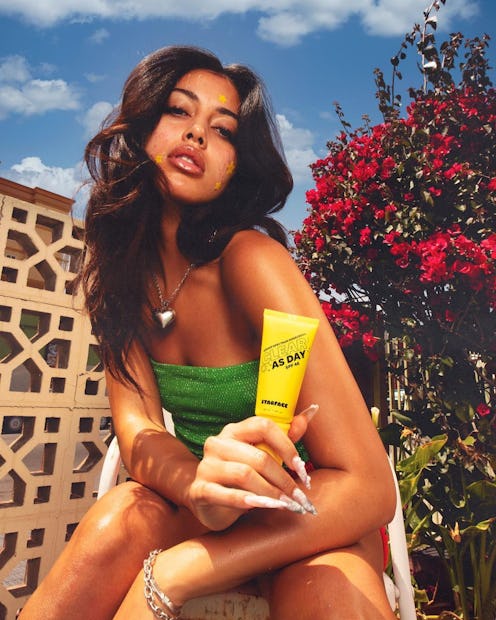(Skin)
The Best Sunscreens For Acne-Prone Skin — & The Ingredients To Avoid
Protect your skin, minus the breakouts.

Summer is full of frustrating dilemmas: melted makeup, ingrown hairs on your bikini line, a short-lived spray tan. SPF-related breakouts are another hot weather beauty quandary that cause many people to stray from applying sun protection altogether for fear it may lead to acne (please, don’t do this). Sun protection is still incredibly important, even if you have reactive skin, which is why finding a sunscreen for acne-prone skin formulated with ingredients that don’t irritate you more is crucial.
Read more: How To Treat Fungal Acne On Your Face When Nothing Else Works
Read more: 25 Sunscreens For Mature Skin That Derms Can’t Stop Recommending
As chemist, esthetician, and founder of eponymous acne skin care line Marie Veronique says, foregoing sun protection can actually backfire when it comes to your breakouts. “Lack of SPF protection will increase the generation of free radicals that attack cells and cell structures, thus increasing inflammation,” Veronique tells TZR. Inflammation is also the root cause of many skin problems and can contribute to acne, specifically inflammatory acne. If you’re committed to protecting your skin but would rather not deal with breakouts, it’s all about choosing the right sunscreen formula, and being able to navigate various sunscreen ingredients. Keep reading to learn how to pick the right sunscreen for acne-prone skin.
Physical Vs. Chemical SPF
First things first: It’s important to distinguish between chemical and physical sunscreen formulas. According to Veronique, the word “sunscreen” — as opposed to “sunblock” — is the tip-off. “Chemical sunscreens are called ‘sunscreens’ and protect the skin by absorbing UVB rays, lowering energy levels, and releasing energy as heat,” she says. They do this through chemicals like octisalate, homosalate, oxybenzone, and avobenzone, among others. Mineral versions, on the other hand, are called ‘physical sunblocks’ because they reflect (or block) UV rays. They’re made of zinc oxide, titanium dioxide, or a mix of both.
For those with acne-prone skin, a physical (or mineral) sunblock is considered less irritating (and less inflammatory) than its chemical counterpart. “If you use a chemical sunscreen, you’re potentially increasing the irritation inflammation cycle that shows up as breakouts,” notes Veronique. And get this: Veronique says that chemical sunscreens actually break down in the presence of UV, which can ultimately cause even more free radical generation than if you used no protection at all.
Therefore, if your skin is sensitive and prone to breakouts, it’s wise to opt for mineral sunblocks and stick to a formula that uses zinc oxide or a combo of zinc oxide and titanium dioxide (versus a titanium dioxide-only), as zinc oxide ensures you’re protected against both UVA and UVB rays. Of course, a zinc formula can leave a telltale white cast, so if you have a darker skin tone, look for a tinted formula to prevent that unwanted ghostly pallor.
What To Look For & What To Avoid
Because physical sunscreens are gentler, they’re less likely to cause irritation for breakout-prone skin types, but here’s the catch: Unlike chemical sunscreens (which are touted for their thin, wearable consistency), physical sunblocks are known to be thicker, sit on top of the skin, and not absorb as easily — aka an oily, acne-prone skin type’s worst nightmare. Thankfully, the beauty industry has come a long way from the days of thick, goopy sunscreens that leave behind a greasy residue and a gnarly white cast. Bottom line: You have options.
Board-certified dermatologist Dr. Todd Minars suggests looking for SPF formulas that are labeled non-comedogenic, meaning they’re designed not to clog pores. “Products that are labeled non-comedogenic shouldn’t contain ingredients that are known to clog the pores, but no two patients are going to respond and react uniformly in all instances,” he says. “That being said, the goal is to stay within the universe of ‘less likely to cause acne’ products, which will often be products labeled ‘non-comedogenic.’”
Dr. Minars also says to try to steer clear of silicones in your SPF products. While they’re commonly used because they're water-resistant, affordable, and generally considered "low hazard" for human use, they can trap debris, dirt, bacteria, and sweat, which can cause issues if you have acne-prone skin. Instead, in addition to zinc oxide, he says to look for formulas that call out hyaluronic acid, a humectant that helps the skin retain moisture, and niacinamide, a vitamin B3 that helps reduce the appearance of redness in the skin. Both of these will help to prevent skin dehydration (a condition that can cause your skin to produce more oil to moisturize dry patches, and thus clog your pores — a vicious, but common, cycle).
Worried that your SPF is contributing to breakouts? Dr. Minars explains that you’ll know you’re experiencing SPF-related skin sensitivity if you have skin discoloration (redness), itchiness, a slight burning or a stinging irritation, dryness (with or without flaking or peeling), a general tautness, and the presence of more acne breakouts after application. If you’re noticing any of these symptoms — which can either occur immediately, making it easier to connect the dots, or a few days later — it might be time to switch to a physical sunblock.
Check out a few of the best sunscreen options on the market right now.
Sunscreen For Acne-Prone Skin
We at TZR only include products that have been independently selected by our editors. We may receive a portion of sales if you purchase a product through a link in this article.
This article was originally published on